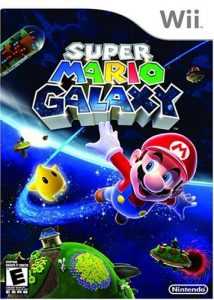Welcome to the first-ever Season of Switch post! Kicking off this season is, of course, the launch of the Nintendo Switch itself four days ago; it's been sold out almost everywhere since then. In fact, it's said that the Switch has sold faster than the Wii did in its first few days after launch! While there have been a few hardware (screen bezels scratching when docking) and software (Joy-Con syncing) issues, reviews are mostly positive. The console has real potential, and that will continue to be shown through software fixes and new games that will be released over time.
Anyway, it's time for the first game feature: Super Mario Galaxy!

While the story is rather simple, it is compelling at the same time: Bowser attacks the Mushroom Kingdom during the Star Festival and kidnaps Peach. Mario is thrown out into space where he wakes up on a mysterious planet. Eventually, he finds his way to a crippled Comet Observatory, the hub of the game. He learns that Bowser stole its power supply, Power Stars, to travel the universe. Peach is in the center of the universe with Bowser, and the only way to get there is to restore power to the Observatory by getting the Power Stars back. It's not the most complex plot, sure, but throughout the game it's not only Peach you're trying to save - the fates of Rosalina, the creator of the Comet Observatory, the Lumas, her star-shaped companions, and the entire universe (which Bowser's trying to conquer) are in your hands. Plus, Mario (and, if you do enough, Luigi) utilizes his new spin power to travel across galaxies and planetoids within those galaxies, discovering unique life forms, anomalous Prankster Comets, and yes, Star Bits to collect. But Super Mario Galaxy still feels like a Mario game - just on a more cosmic level.
Though the Wii and one of its flagship titles may seem aged at this point with the launch of Nintendo Switch, Super Mario Galaxy (along with its sequel, Super Mario Galaxy 2, released in 2010) hasn't aged at all; no other game quite captures the mixture of the lightheartedness of Mario, new 3D gameplay mechanics, and a surprisingly epic and intense story embodied by Super Mario Galaxy. But when Super Mario Odyssey comes out later this year, we'll see.
To finish off this feature of Super Mario Galaxy, here's one of my favorite galaxies in the game: Buoy Base Galaxy.